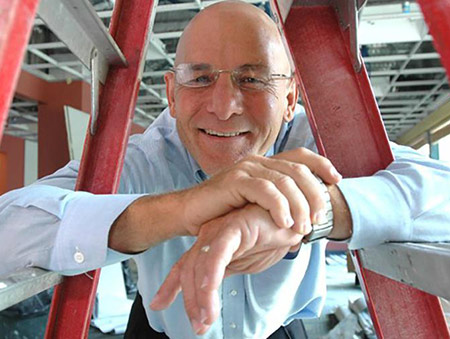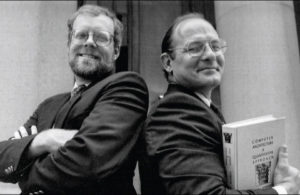David Patterson: A winning RISC
 Keep it simple. David Patterson used this design principle for computer architecture, leading to faster, energy-efficient microprocessors that power billions of smartphones and tablets on the market today.
Keep it simple. David Patterson used this design principle for computer architecture, leading to faster, energy-efficient microprocessors that power billions of smartphones and tablets on the market today.
Patterson was a professor of computer science at UC Berkeley from 1976 to 2016, and is now a professor of the graduate school and a distinguished engineer at Google. He coined the term reduced instruction set computer, or RISC, in 1980 to describe an approach that veered from the complex systems that were prevalent at the time. RISC required a smaller set of simple, general instructions for computing function, requiring fewer transistors.
In 1982, the RISC-I processor built by Patterson, Professor Carlo Séquin and their Berkeley team outperformed a conventional design that used more than twice as many transistors to operate. By the mid-1990s, RISC microprocessors were dominant throughout the field.

John Hennessy (left) and David Patterson with their influential textbook, Computer Architecture, circa 1991. (Photo by Shane Harvey)
Patterson teamed up with fellow computer scientist John Hennessy, who was conducting similar research at Stanford University. Together they published, in 1990, a foundational textbook, Computer Architecture: A Quantitative Approach, establishing an analytical and scientific framework for engineers to evaluate microprocessor design. The text is credited with shifting the emphasis from raw performance power to an approach that takes energy usage, heat dissipation and off-chip communication into account.
Earlier this year, the Association for Computing Machinery honored the work of Patterson and Hennessy with the prestigious A.M. Turing Award, considered the Nobel in computing sciences.
“UC Berkeley is among the leading universities with Turing laureates among its faculty and alumni, so my share of this award is really recognition of my good fortune of having built my career here,” said Patterson upon winning the $1 million prize.
To mark the 50th anniversary of computer science at Berkeley, Patterson helped organize a special lecture series that brings together eight Turing laureates with ties to the university. He will be giving his lecture, “A New Golden Age for Computer Architecture,” at 4 p.m. on Wednesday, Oct. 10, at Sutardja Dai Hall’s Banatao Auditorium.
“The 1970s and 1980s represented a golden age of computer science research at Berkeley,” said Patterson. “A remarkable seven research projects that began here went on to earn Turing awards.”
To learn more:
- David Patterson, pioneer of modern computer architecture, receives Turing Award
- Simplify: The RISC Story
